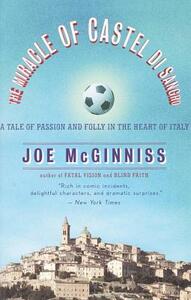You need to sign in or sign up before continuing.
Take a photo of a barcode or cover
44 reviews for:
The Miracle of Castel Di Sangro: A Tale of Passion and Folly in the Heart of Italy
Joe McGinniss
44 reviews for:
The Miracle of Castel Di Sangro: A Tale of Passion and Folly in the Heart of Italy
Joe McGinniss
Joe McGinnis is a journalist who spent 2 years covering the OJ Simpson trial. After the verdict, when faced with spending more of his life on that unpleasant subject, turned down a book deal and decided to follow his new-found passion for soccer. He latched onto a story unfolding in a small town in Italy. This is not a sports book, though fans will love it, but a peek into Italian culture. Prepare to fall madly in love with these characters.
http://readdenaread.blogspot.com/2008/04/truthiness.html
http://readdenaread.blogspot.com/2008/04/truthiness.html
Having witnessed both the crazy love of football outside of this country and the weird chaos that is Italy and Italians, I appreciated this book immensely.
True story in which a journalist from the U.S. spends a year with an underdog soccer team in a small town in Italy. Entertaining, much more engrossing than expected, several plot twists, all the way to the end.
Fascinating book about a fascinating cast of characters and season but by god is Joe McGinnis annoying.
Soccer team from small town in Italy defies the odds and moves to Serie B level of soccer. American writer spends a year with the team. He learns about Italian culture - the good and the bad.
Thoroughly entertaining look at life with an Italian soccer team. McGinniss not only captures the pride of a small town's local sports team, but also the emotions and fanaticism of all sports fans.
Just as everyone who heard The Velvet Underground formed a band, everyone who read this passionate adoration of calcio/soccer, published in 1999, wrote a book of their own. Great for the lay reader - the author explains the concept of penalties and yellow cards to soccer newcomers - and depressing in how his background as a crime writer comes in useful. Fun fact: Gravina, one of the villains of this story, is now a very senior UEFA executive and head of the Italian FA.
I finally decided to buy this book after constantly hearing about it, needless to say I think it was a decent investment. Overall, I was quite captivated by the story and any preconception I had about this being a light-hearted fairytale was quickly thrown out the window.
Like previous reviews have mentioned, I feel that the ball and chain on this book is he author himself. After having watched a single World Cup and whatever big matches Roberto Baggio played in, football seemed to have diffused from the TV screen and into his brain - thus giving him an incredible knowledge and insight into the sport which allows him to be tactically superior than a qualified coach. Or at least that's how he portrays it.
The author frequently showcases his arrogance throughout the story, as I have mentioned Castel's manager is frequently subject to the author's persistent pleas to use formations with a defence consisting of 5 men (do those even exist anymore?). His arrogance is shown again with the potential transfer of Claudio Bonomi to Fiorentina. He states to the woman who told him the news that he "knows Serie A" (he strengthens this knowledge by deciding to write a full-page biography on Baggio in the book) and that whoever told her the news "knows nothing of calcio" and that there's no way Fiorentina would want Bonomi (he exemplifies this by managing to list a couple Fiorentina midfielders). In a shock turn of events, the author proves to be wrong. Although we don't hear a lot about this. McGinniss also demonstrates a sense of entitlement and, in my opinion, complete ignorance when the Pescara fans come to visit Castel Di Sangro. He proceeds to label them "fish heads" and when the Pescara fans begin to light flares in the stadium he states "Blue! Their color!". I'm not sure if McGinniss has ever encountered away fans before as he seems peculiarly startled by this event.
Although I might be portraying the book in a bad light thus far, I found it to be a captivating read despite the author's constant meddling and know-it-all personality. I have to admit, I do slightly admire the author's bravery towards the end to stand up to the high-up figures such as Signor Rezza and Gravina in order to speak (or yell, rather) his opinions on his adopted love. Alas, the book ends on a bad note as McGinniss decides to insult the players he has travelled the length and breadth of Italy with for nine months, such as saying to a player that Che Guevara (the player's idol) would have been ashamed of him and he then says to another player that Pippo and Danilo (two Castel players who had died in a car accident a few months prior) "would be ashamed of you" in response to the players being involved in match-fixing. I feel that these insults are unnecessary and nevertheless tasteless.
The author originally arrived to Castel Di Sangro as a writer, a spectator. But I feel that he had gotten too involved and attached to the team. It was never his duty to support the club, just to document its season. And although he didn't hold back on the latter, I think he placed too much of his emotions into this journey.
Like previous reviews have mentioned, I feel that the ball and chain on this book is he author himself. After having watched a single World Cup and whatever big matches Roberto Baggio played in, football seemed to have diffused from the TV screen and into his brain - thus giving him an incredible knowledge and insight into the sport which allows him to be tactically superior than a qualified coach. Or at least that's how he portrays it.
The author frequently showcases his arrogance throughout the story, as I have mentioned Castel's manager is frequently subject to the author's persistent pleas to use formations with a defence consisting of 5 men (do those even exist anymore?). His arrogance is shown again with the potential transfer of Claudio Bonomi to Fiorentina. He states to the woman who told him the news that he "knows Serie A" (he strengthens this knowledge by deciding to write a full-page biography on Baggio in the book) and that whoever told her the news "knows nothing of calcio" and that there's no way Fiorentina would want Bonomi (he exemplifies this by managing to list a couple Fiorentina midfielders). In a shock turn of events, the author proves to be wrong. Although we don't hear a lot about this. McGinniss also demonstrates a sense of entitlement and, in my opinion, complete ignorance when the Pescara fans come to visit Castel Di Sangro. He proceeds to label them "fish heads" and when the Pescara fans begin to light flares in the stadium he states "Blue! Their color!". I'm not sure if McGinniss has ever encountered away fans before as he seems peculiarly startled by this event.
Although I might be portraying the book in a bad light thus far, I found it to be a captivating read despite the author's constant meddling and know-it-all personality. I have to admit, I do slightly admire the author's bravery towards the end to stand up to the high-up figures such as Signor Rezza and Gravina in order to speak (or yell, rather) his opinions on his adopted love. Alas, the book ends on a bad note as McGinniss decides to insult the players he has travelled the length and breadth of Italy with for nine months, such as saying to a player that Che Guevara (the player's idol) would have been ashamed of him and he then says to another player that Pippo and Danilo (two Castel players who had died in a car accident a few months prior) "would be ashamed of you" in response to the players being involved in match-fixing. I feel that these insults are unnecessary and nevertheless tasteless.
The author originally arrived to Castel Di Sangro as a writer, a spectator. But I feel that he had gotten too involved and attached to the team. It was never his duty to support the club, just to document its season. And although he didn't hold back on the latter, I think he placed too much of his emotions into this journey.
This is more than just a book about soccer. It's about relationships and how those shape both events and lives. It's about how soccer is an essential part of Italian culture, but also how Italian culture shapes the calcio. And if anyone's worried about not understanding either the soccer or the league system, McGinniss is pretty good about explaining things clearly, but not talking down to the reader. In general his writing is evocative and emotional - the sort of sports writing we need more of.
hopeful
informative
reflective
slow-paced






